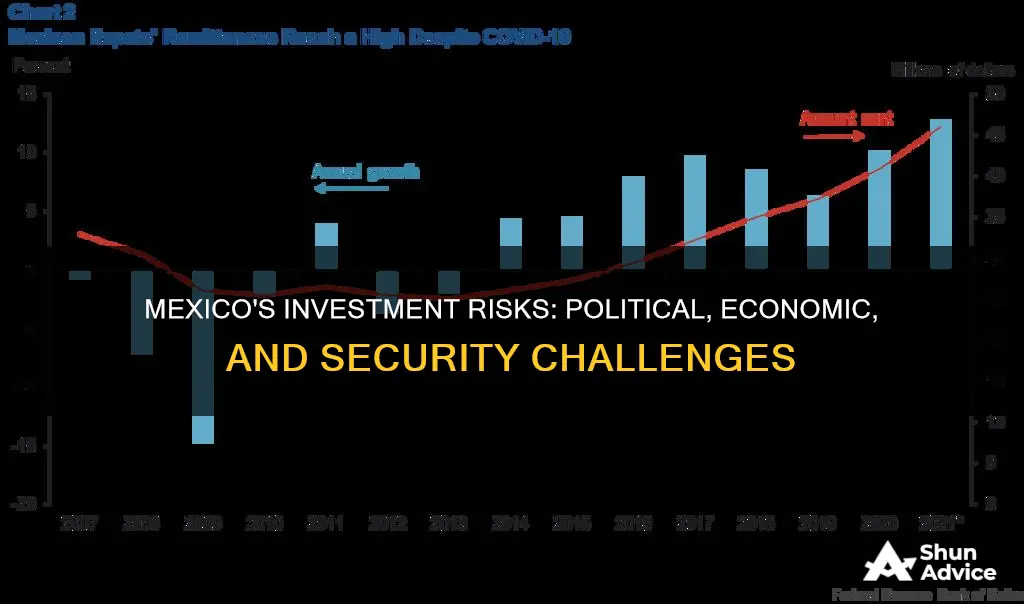
Mexico is an attractive prospect for foreign direct investment (FDI) due to its strong integration into the world economic order, strategic geographic location, and competitive labour costs. However, investing in Mexico comes with several risks that businesses should be aware of. These risks can be categorised into four types: operational, compliance, reputational, and strategic. Operational risks include personnel challenges and physical security threats, such as crime and violence, which have increased in certain states. Compliance risks arise from complex and time-consuming startup requirements, labour laws that favour employees, and cumbersome tax regulations. Reputational risks are associated with the presence of organised crime and human rights issues, which have led to due diligence requirements for companies operating in Mexico. Finally, strategic risks include uncertainty over US-Mexico border logistics and the impact of US elections on Mexico's economy. Overall, while Mexico offers many opportunities, investors should carefully consider and mitigate the potential risks before entering this market.
What You'll Learn

Security issues: Crime, violence and corruption
Crime, violence, and corruption are significant concerns for businesses considering investment in Mexico. The country's security issues pose notable risks that companies must carefully consider and navigate.
Crime and violence are prevalent in Mexico, with homicides remaining at near-record levels despite the pandemic. The country experiences approximately 90 murders per day nationwide, and there is continued concern over violence between organised crime groups. This poses a direct threat to the safety of individuals and businesses operating in the country. The militarisation of public security and the associated human rights violations further contribute to the complex security landscape.
The transit of goods is a particular area of concern for businesses. Cargo being transported and the security of warehouses are identified as significant threats. Companies address these challenges by operating in gated industrial parks with security features and collaborating with trusted loss protection teams. The cost of security measures can be significant, with companies reporting spending between 2% and 4% of their annual budget on security.
Corruption is another critical issue in Mexico, impacting the business environment and investor confidence. Mexico ranks 126th out of 180 countries in the Transparency International Corruption Perception Index, a ranking of serious concern. Bribery and corruption are widespread, and impunity levels are high, with major corruption cases often going unpunished due to reduced institutional capacity. The rule of law and control of corruption fall below Latin America's average, and political use of anti-corruption investigations has been criticised.
The current administration has made tackling corruption a priority, and several high-ranking former public figures have been investigated. However, the effectiveness of these efforts is limited by reduced institutional capacity and obstructive action. Additionally, the economic policy of the current administration, focused on reviving the state hydrocarbon company PEMEX, has contributed to uncertainty among investors.
Businesses considering investment in Mexico must carefully assess and address these security issues. Implementing comprehensive risk mitigation strategies, partnering with experienced local providers, and adhering to anti-bribery and anti-corruption legislation are essential steps to navigate the challenges posed by crime, violence, and corruption in the country.
Smart Ways to Invest 8 Lakhs in India
You may want to see also

Political risk: Uncertainty and instability
Political risk is a key consideration when investing in Mexico. The country's political framework has historically been relatively stable, with smooth handovers of power. However, the election of Claudia Sheinbaum as Mexico's first female president in June 2024 introduced a period of uncertainty and instability. Sheinbaum's leftist coalition government has pursued an interventionist policy agenda, including controversial judicial reforms and increased regulation in the energy and mining sectors.
The energy sector has been a particular focus, with the government seeking to revive the state hydrocarbon and electricity companies PEMEX and CFE. This has created a challenging business environment, with changing regulations and uncertainty deterring private and foreign investment in the energy sector, especially in clean energy. The government's protectionist policies towards these sectors may limit growth, as the state is unlikely to be able to cover the required high levels of investment.
The government has also prioritised tackling corruption, investigating several high-ranking former public figures allegedly involved in corruption scandals. However, impunity levels remain high, with major corruption cases going unpunished due to reduced institutional capacity. This issue is exacerbated by the government's increased use of opaque single-source contracting in public procurement during the COVID-19 pandemic, which has raised concerns about a lack of transparency.
The new government has also expanded social programmes targeting students, the poor, and the elderly, aiming to tackle violence and poverty, which are seen as root causes of insecurity. However, security remains a significant challenge, with homicides at near-record levels and continued violence between organised crime groups. The militarisation of public security and the weak rule of law have contributed to a perception of instability and uncertainty.
Mexico's close economic ties with the US also introduce a degree of political risk. The country is highly sensitive to the US business cycle, with around 80% of exports destined for the US market. Changes in US policies, such as the potential renegotiation of the USMCA trade deal due to concerns over Chinese investment in Mexico's automobile industry, can have significant implications for Mexico's economy.
Building an Investment Firm: Strategies for Success
You may want to see also

Economic volatility: Inflation, interest rates and oil prices
Economic volatility is a key risk factor for investors in Mexico, with inflation, interest rates and oil prices all presenting potential challenges to the country's economic stability.
Mexico's economy is heavily influenced by oil prices, with oil revenues accounting for around 30% of public revenues. This makes the country particularly vulnerable to fluctuations in the global oil market. A decline in oil prices can lead to a decrease in government revenue, impacting fiscal policies and economic growth.
Mexico's inflation rate has been on an upward trajectory, reaching an annual rate of 7.82% in 2022. While the country targets an inflation rate of 3%, the effects of the pandemic and geopolitical tensions have contributed to rising prices. The Central Bank of Mexico (Banxico) has implemented a series of interest rate hikes to combat inflation, with the interest rate reaching 11.25% in March 2023. However, these higher interest rates can have a dampening effect on economic activity, impacting consumption and business investment.
The country's interest rates are also influenced by the US Federal Reserve's monetary policy decisions. As Mexico's economy is closely tied to the US, with around 80% of exports destined for the US market, changes in US interest rates can have a ripple effect on Mexico's economy. Higher US interest rates can lead to capital outflows from Mexico, putting pressure on the Mexican peso and affecting the country's ability to service its external debt.
In summary, investors in Mexico need to be mindful of the potential impact of economic volatility, particularly the effects of oil price fluctuations, inflation, and interest rate changes. These factors can influence the country's fiscal health, the business environment, and the overall attractiveness of Mexico as an investment destination.
Outsourcing IT Services: Benefits of Managed IT Services
You may want to see also

Business environment: Regulation, compliance and bureaucracy
Mexico's business environment is considered competitive yet deteriorating, with a moderate level of political risk. The country has a strong legacy of pro-business reforms and ranks above the Latin American average in the structural business environment. However, there are some challenges when it comes to regulation, compliance and bureaucracy.
One of the main challenges for businesses in Mexico is the amount of bureaucracy and red tape involved in starting and operating a business. Dealing with the paperwork required to register with the authorities, get electricity, secure construction permits, file property, and enforce contracts can be time-consuming and arduous. The government departments responsible for processing trade permits have a reputation for being slow, which can be an issue for time-sensitive investments.
Mexico's Federal Labor Law governs employment regulations and is similar to the laws found in the US, Canada, and other locales, but there are some unique differences. Understanding the basic requirements around the workweek, overtime, benefits, and termination is essential for companies operating in Mexico.
Paying taxes in Mexico can also be a labour-intensive task, often requiring over 200 hours of a business' time per year due to the need for in-person interactions and hard-copy documents. Mexico's tax requirements are strict and require a detailed recording of transactions, money, and beneficiaries.
In addition to federal laws, companies doing business in Mexico must also comply with environmental regulations. SEMARNAT, the country's primary federal environmental agency, is responsible for ensuring companies' compliance with environmental protections, such as natural resource conservation and the safe management of materials. Manufacturers, in particular, will need to secure permits and authorisations from SEMARNAT and maintain proper documentation.
To navigate these regulatory complexities, many companies choose to partner with seasoned providers or shelter service providers who can help them streamline their entry process, ensure legal compliance, and mitigate operational risks. Implementing robust internal controls, conducting due diligence on suppliers and partners, and investing in employee training on compliance and security protocols are also essential components of a comprehensive risk management strategy.
Venture Capitalists: Mitigating Investment Risks and Strategies
You may want to see also

Human rights: Gender-based violence and labour rights
Human rights in Mexico are a serious concern. The country has made some progress in recent years, but there are still significant issues surrounding gender-based violence and labour rights.
Gender-Based Violence
Mexico has extremely high levels of violence against women, and its laws do not adequately protect women and girls against gender-based and sexual violence. According to the National Survey of Victimization and Perception of Public Safety, 93.3% of crimes in 2020 were either not reported or not investigated. The country also has an extremely high rate of impunity for crimes, including human rights violations, with a near 95% impunity rate.
Journalists and human rights defenders face violence and intimidation, both in person and online. Mexico is consistently recognised as one of the most dangerous places in the world to be a journalist, second only to Afghanistan. In the first six weeks of 2022, five journalists were killed because of their profession, and several more narrowly escaped violent attacks.
Labour Rights
Mexico's labour laws favour employees, and the country has ratified eight fundamental labour rights conventions and over 80 ILO conventions. The Mexican Constitution sets out rights to organise unions and strikes, a minimum wage, an eight-hour workday, compensation following unjustified termination of employment, and protections for women and children. However, union leaders in Mexico are a powerful interest group, and their influence can affect workers' meaningful representation.
Mexico's Federal Labor Law governs almost every aspect of employment but can be tricky to navigate. Understanding the basic requirements around the workweek, overtime, benefits, and termination can help companies establish a strong foundation for their employees. Good hiring practices and retention strategies can also help reduce the risk of expensive employee churn or hiring the wrong candidates.
While Mexico has made strides in increasing worker protections, the presence of organised crime has created a troubling picture around human rights. For example, legislation passed in Germany in 2023 requires companies operating in Mexico to perform due diligence to ensure all parties within their supply chain respect human rights.
Invest Wisely to Attain Millionaire Status
You may want to see also
Frequently asked questions
There are several risks associated with investing in Mexico, including security issues related to drug trafficking, high levels of corruption, and a volatile business environment due to policy changes. The country's heavy reliance on oil revenues and its sensitivity to US business cycles can also impact economic stability.
Mexico's political landscape can impact investment risks, with upcoming elections and policy changes potentially affecting economic growth and market volatility. Changes in government can lead to shifts in economic policies and reforms, which may create uncertainty for investors.
Security issues related to drug trafficking and organised crime are significant concerns in Mexico. The country has a high homicide rate, and there are frequent reports of violence and aggression, including against journalists. Businesses often need to allocate a significant portion of their budget to security measures.
Corruption is a significant issue in Mexico, ranking 126th out of 180 countries in the Transparency International Corruption Perception Index. High-ranking public figures have been implicated in corruption scandals, and impunity levels remain high. This can create uncertainty and increase the risk for investors.
Operational risks in Mexico include personnel challenges and physical security concerns. Understanding the local labour laws and hiring practices is essential. Additionally, crime and incidents of violence have increased in certain states, impacting the transit of goods and creating a need for enhanced security measures.







